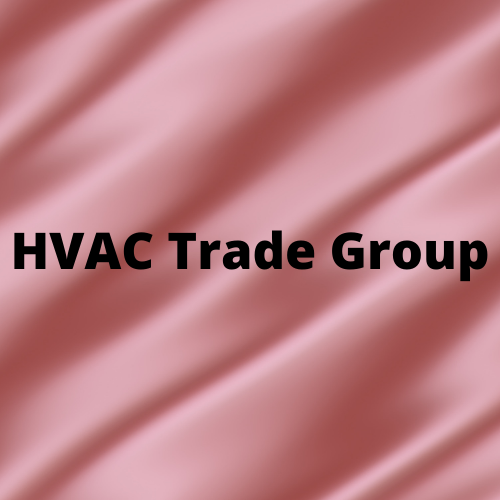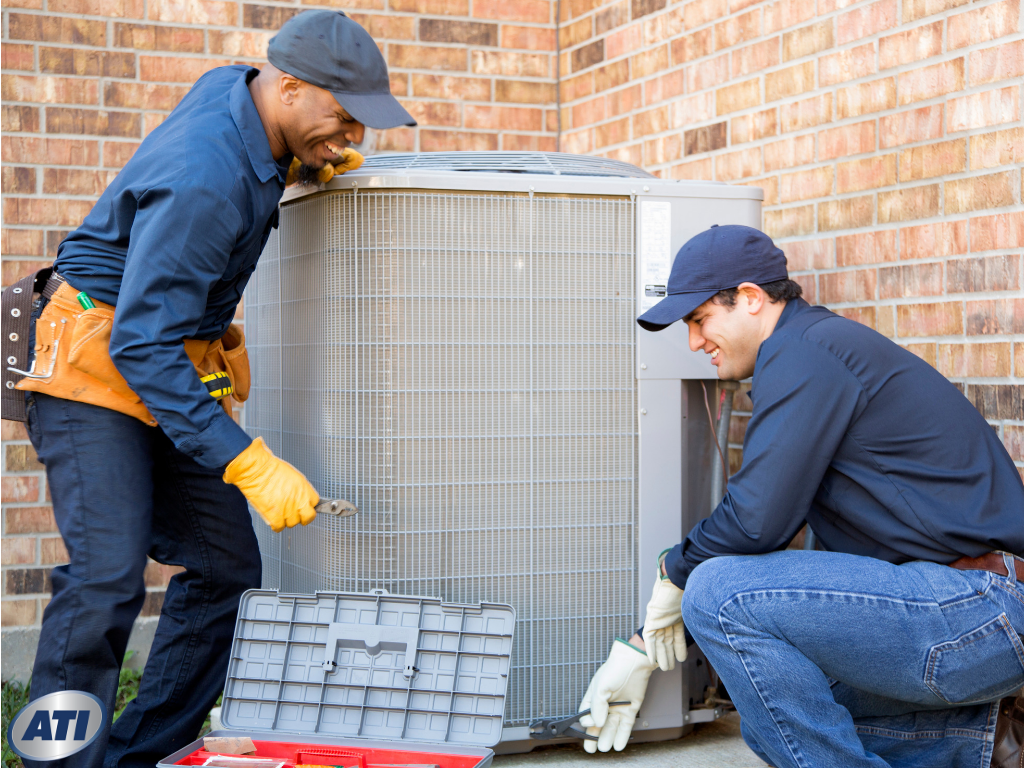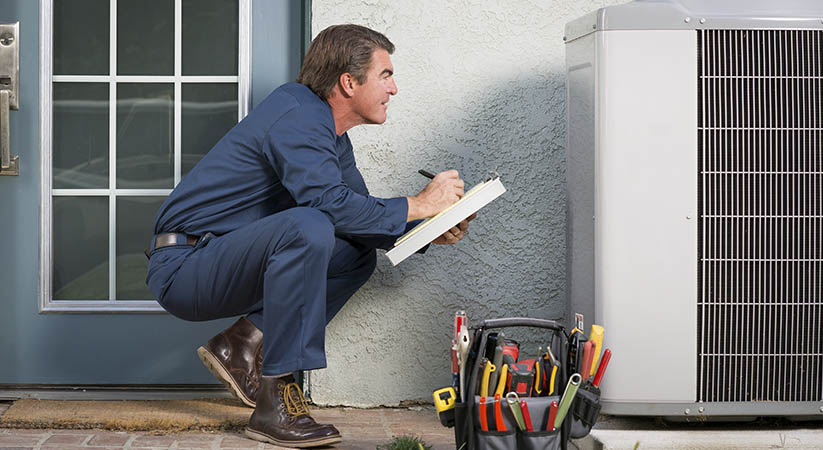
HVAC Trade Group
HVAC Services

Heating, ventilating, and air conditioning (HVAC) is the science of vehicular and indoor environmental comfort. The primary purpose of HVAC is to provide acceptable indoor air quality and thermal comfort for a building's occupants. This is achieved by regulation of temperatures, ventilation of conditioned air, and the utilization of energy to maintain a consistent room temperature. Because HVAC systems often include ductwork, heating and air-conditioning systems utilize energy to transfer heat from one location to another and mechanical systems provide the mechanism for transferring cooled air from one location to another.
Since HVAC requires the use of fuels and combustion products in its operation, it creates pollutants in the indoor environment. Some emissions are formed because of the energy required to move the HVAC system components and some emissions are formed as a result of the ventilation process. Some emissions can be reduced by taking advantage of appropriate HVAC maintenance and heating and air-conditioning systems or by installing filterless and energy-efficient furnaces and ductwork. However, regardless of whether the source of the HVAC emission is HVAC equipment combustion product, or vents or ducts, an effective HVAC cleaning and maintenance program is important to control indoor pollution.
The three chief functions of HVAC systems are to maintain a comfortable temperature, to control the moisture content of the indoor air, and to regulate the temperature inside the outdoor space. It is through these three activities that HVAC systems help provide comfortable indoor air quality, but some HVACs require frequent maintenance and servicing. When HVAC equipment and ducts are not properly maintained, HVAC performance and indoor air quality are negatively affected. The most common maintenance tasks performed by HVACs are cleaning, inspecting, and replacing various HVAC parts. Other maintenance tasks include upgrading or repairing the furnace, ductwork, or evaporator coil.
The majority of HVAC units are powered by one of the following technologies: electrical, gas, or hydraulic. If your HVAC is powered by electricity, it is considered an electric-powered HVAC system. Most central air conditioning and heating systems in residential homes and small businesses are powered by electricity. Your HVAC's electric control system is usually contained within a boiler or furnace. Boilers are designed to be water-cooled, so they must be cleaned and serviced on a regular basis to remove dirt, debris, and moisture. In addition, most boilers and furnaces require their own filters and should be changed on a monthly, quarterly, or semi-annual basis according to the manufacturer's specifications.
Another type of HVAC is a gas-powered heating and cooling system. Gas-powered HVACs are preferred for locations where high utility costs are expected, such as commercial buildings and office buildings. Gas-powered HVACs generally have better performance than electric-powered HVACs, but they tend to emit more pollutants into the atmosphere. Many homeowners prefer gas-powered HVACs because they can control their heating and cooling system more precisely than they could with an electric-powered HVAC. Electric-powered HVACs are often less expensive to operate.
Although your HVAC system is maintained by a licensed professional licensed HVAC technician, it is still a good idea to do some regular repairs and maintenance to keep your HVAC working efficiently. Before scheduling any work, be sure to check with your HVAC service company to ensure that your HVAC system will be ready for your scheduled repair or maintenance. You should also be aware that your HVAC system does need routine maintenance, even if it seems like it is working properly. Scheduling maintenance on your HVAC periodically is a good idea, although you should not wait too long between scheduled maintenance visits, as dirty filters can build up over time. Your HVAC system is a large investment, so it only makes sense to take good care of it.
How HVAC Improves Comfort and Revenue

Heating, ventilation, and air conditioning are the science of vehicular and indoor environmental comfort. Its objective is to offer satisfactory indoor air quality and thermal comfort to the occupants of the rooms. In the United States, HVAC has been defined as the science or art of heating, ventilating, and air-conditioning. More specifically, HVAC services are offered for residential, commercial, institutional, and industrial applications.
For a home or building with HVAC, the three main techniques used to cool and heat are ductwork, mechanical ventilation, and natural ventilation. Among these techniques, ductwork is the most popular and extensively used because it provides efficient heating and cooling via air ducts that direct air inside the room. Moreover, it can be built into walls and can also incorporate ceiling vents. Mechanical ventilation uses ventilators and filters to remove pollutants in HVAC. Natural ventilation, on the other hand, uses strategically placed fans, blowers, and ventilators to bring in outside air.
Although HVAC is a source of eco-friendly energy, some people question the efficiency of such system. They argue that HVAC makes use of too much electricity that causes global warming. Meanwhile, HVAC proponents point out that natural ventilation and heating reduce the buildup of allergens and toxic substances in indoor air. Lastly, HVAC's contribution to indoor air quality contributes to a more pleasant indoor environment.
In order to regulate the temperature in a room, an HVAC system employs the use of a furnace, a heat pump, or air conditioner. A heat pump uses heat energy from the environment and transfers it to a heating system through a compressor. Meanwhile, the air conditioner uses a fan to circulate cool air in the room and minimize the formation of condensation. If these technologies are used together, HVAC can successfully maintain a consistent indoor temperature.
Because of these technologies, the HVAC system has become very efficient. With this said, however, there are still issues concerning HVACs and comfort. As mentioned earlier, HVAC systems require ducts in order to circulate the heat and cool air inside the house. Since ducts may get blocked by dirt and debris, it is important that homeowners regularly clean them.
Aside from ducts, HVAC systems also employ boilers. The boilers, on the other hand, convert natural gas or propane into electricity and use it to produce warm water for indoor water fixtures and swimming pools. While HVAC systems can effectively provide comfortable temperature control, they do not eliminate the need for conventional heating and cooling systems. This means that homeowners will still need to use a conventional heater, even if they have an HVAC system inside their homes.
Know More About HVAC Basics

Heating, Ventilation, and Air conditioning (HVAC) are the scientific technology of vehicular and indoor environmental conditioning. It aims to give acceptable indoor air quality and thermal comfort in the premises. HVAC systems use natural ventilation systems, controlled by a number of components, including combustion, humidification, exhaust, and buffering. Some of the more common components include pumps, compressors, evaporators, and heat pump trainers. HVAC systems have become an important part of our lives, as they can be customized for a wide range of applications, such as residential homes, commercial establishments, or industrial manufacturing plants.
If you are looking for HVAC basics, you need to understand how HVAC works. HVAC is commonly referred to as "heating, ventilating, and air conditioning," or simply HVAC. Regardless of the name, HVAC has been involved in our daily lives for a long time, starting from the time we made use of fireplaces.
A HVAC unit is a mechanical device that converts mechanical energy (in the form of heat or cold) into electrical energy. The purpose of HVAC is to regulate the temperature and quality of air within a room. In simple words, an HVAC system controls how warm it is outside while at the same time cooling down your living space. In fact, heating and cooling systems control the temperature of the entire house, including your bedroom. For this reason, HVAC units are categorized according to their ability to change the temperature of the air inside a room. Basically, these units work on three principles: the thermostat, the heating coil, and the air-conditioning unit.
The function of HVAC is not only limited to temperature regulation. Other HVAC basics include humidity control, ventilation of the house, air cleaning, air conditioning unit maintenance, and ventilation of the exhaust. If you are not sure what these things are, then it is time to learn more about HVAC services and home services offered by HVAC companies. From this point of view, you will be able to get the best value of your money with the help of HVAC services.
According to the HVAC basics, an HVAC system mainly consists of different components such as the compressor, the condenser, evaporator, and the air-conditioning unit. With regards to natural ventilation, the system uses a fan to distribute the cool air in the room and provides fresh air from outside. Meanwhile, mechanical ventilation consists of adding fans and vents in order to improve the ventilation in the building or room. This principle also includes the addition of insulation material in order to reduce the energy consumption of the HVAC.
So, do you know that HVAC stands for heating, ventilating and air conditioning? That is the reason why there are different HVAC services and equipment available in the market today. This is very beneficial for the homeowners because it can lower the energy consumption rates of their HVAC system. Furthermore, they can also make use of the natural cooling through the vents or fans. In this way, the HVAC systems can provide safe and clean air inside the room.
Member Spotlight
Northeast Mechanical Services
3517 Focus Dr Suite B
Fort Wayne, IN 46818
260-486-1988
https://www.northeastmechanicalservices.com/
https://g.page/NEMechanicalServicesINC?share
HVAC systems are one of the most important and critical components in the overall functioning of a house. Thus, it is not surprising that such systems require a thorough professional setup, from their installation right up to their disposal. A well informed homeowner would always ensure that his HVAC system has a professional installation. However, as the number of HVAC units is on the rise, there is a scarcity of qualified professionals who are well versed in the field of
HVAC systems installation. In such a scenario, HVAC professionals or agencies that provide such services make it their business to know the details of the installation of HVAC systems, and are capable of installing HVAC systems without damaging them in the process.
About Us
Whether you own a small business, rent an office space or work for a large HVAC company, it is always important to have a professional on your side. HVAC Trade Group is a professional plumbing company that focuses on commercial and residential HVAC installations. Although the services they provide are cheaper than most professionals, it is still worth the cost to have a professional on call for emergencies, as opposed to waiting for a plumber to show up and fix the issue on their own. HVAC Trade Group commercial services include: chimney, water heater, hot water tank, gas furnace, condenser, dehumidifier, drain pan, water softener, shower systems, full service plumbers, and more.



